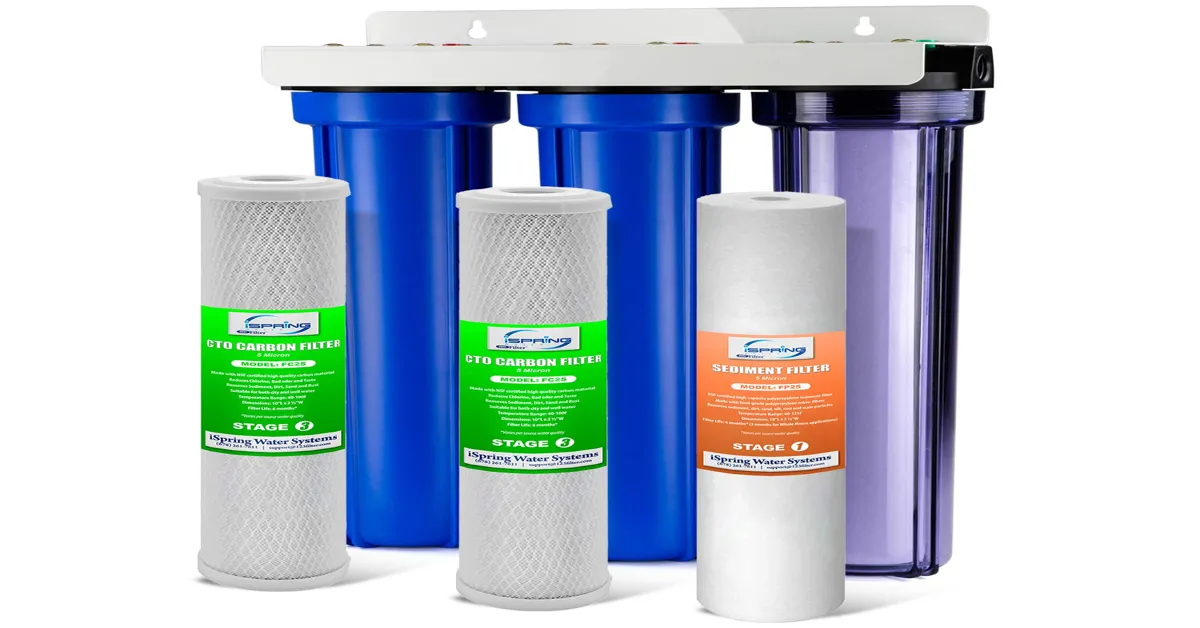Selecting the best water filter for your home is akin to choosing a trusty sidekick in the quest for clean, pure water. It’s a journey filled with twists and turns, with a plethora of options vying for your attention. Yet, fear not, for the path to hydration clarity is not as daunting as it seems.
The key lies in understanding the unique needs of your household and the specific contaminants you’re up against. Whether it’s battling the nefarious lead, the stealthy chlorine, or the elusive bacteria, there’s a hero for every villain in the water world. For those in pursuit of a versatile defender, a whole-house water filtration system might just be the knight in shining armor.
It guards every tap in your domain, ensuring that from the shower to the kitchen, purity reigns supreme. On the other hand, if your quest is more focused, perhaps a point-of-use filter, such as a pitcher, under-sink, or countertop model, will serve you well, targeting specific areas where the dragon of contamination lurks. Remember, the best water filter for your home doesn’t wield its power through complexity but through the right fit for your castle.
So, arm yourself with knowledge, consider your household’s water consumption and specific contaminant foes, and you shall emerge victorious in the quest for the purest drop.
Key Takeaway
- Understanding your household’s water quality and specific contaminants is vital in choosing the best water filter for your home.
- Options range from whole-house water filtration systems, which purify water at every tap, to point-of-use filters like pitchers and under-sink models that target specific areas.
- A multi-stage filtration system is recommended for comprehensive protection against a variety of contaminants, while carbon-based filters are ideal for improving taste and removing chemicals with minimal fuss.
- When selecting a water filter, consider water quality tests to identify contaminants, compare types of filters and their technologies, and evaluate the cost and maintenance required.
- The best water filter integrates seamlessly into your lifestyle, effectively removing contaminants while maintaining essential minerals for safe, great-tasting water.

Types of Water Filters Explained
Choosing the best water filter for your home can feel like navigating a labyrinth of endless options. But fear not, dear reader, for we are about to embark on a quest to demystify this puzzle. Imagine your tap water as a bustling metropolis of particles and elements.
Our goal? To find the perfect guardian that ensures only the purest, most refreshing water reaches your glass. The key to this quest lies in understanding the unique needs of your household. Think of it as matchmaking – but instead of finding the perfect partner, we’re on the hunt for the ultimate water filtration system.
Whether it’s battling chlorine, dodging lead, or evading pesky sediments, the right filter will rise to the challenge, ensuring every sip is as pristine as mountain spring water. Now, let’s dive into the essence of choosing wisely. A multi-stage filtration system often takes the crown, offering a comprehensive defense against a wide array of contaminants.
Picture it as the Swiss Army knife of water filters – versatile, efficient, and always ready for action. However, simplicity has its charm too. For those seeking minimal fuss, a carbon-based filter might just be your knight in shining armor, adept at improving taste and odor while keeping harmful chemicals at bay.
Remember, the quest for the best water filter is not just about purification. It’s about ensuring peace of mind, knowing that every drop of water in your home is as clean and healthy as it can be. So, arm yourself with knowledge, and let the journey to crystal clear water begin.
Key Features to Consider
Selecting the best water filter for your home can feel like navigating a labyrinth of brands, models, and jargon that seems almost designed to confound. But fear not! The quest for crisp, clean water can actually be distilled into a few straightforward considerations. Whether you’re looking to oust odors, banish bacteria, or simply ensure your H2O is as pure as mountain spring water, the key lies in understanding your needs and matching them to the right filtration solution.
First off, let’s splash into the world of Water Quality and Contaminants. The essence of selecting the perfect water filter starts with knowing what’s actually in your water. From the uninvited chlorine taste to more sinister guests like lead or pesticides, the contents of your tap water can vary widely depending on your location and the age of your pipes.
This is where a basic water quality test can be a game-changer, steering you towards a filter that targets your specific concerns. Next, we dive into the realm of Types of Water Filters. From pitcher filters that make your fridge water taste fresher, to under-sink models that wage war on a broader spectrum of contaminants, there’s a veritable ocean of options.
Understanding the pros and cons of Pitcher Filters, Faucet Attachments, Under-Sink Filters, and Whole-House Systems will ensure you don’t end up with a white elephant that barely scratches the surface of your water woes. Now, let’s get our feet wet with Filter Technology. Not all filters are created equal, and the secret sauce lies in the technology behind them.
Activated Carbon filters are the go-to for improving taste and odor, while Reverse Osmosis systems are the heavy hitters capable of removing a broad range of contaminants, including bacteria and viruses. However, they tend to be pricier and require more maintenance. Finally, Cost and Maintenance are crucial droplets to consider.
The initial price tag is one thing, but the long-term cost of replacement filters and the system’s overall lifespan can turn a seemingly sweet deal sour. Additionally, some systems demand more elbow grease to maintain than others, so consider how much time you’re willing to invest in keeping your water pristine. In essence, picking the best water filter for your home boils down to balancing your specific water quality issues with the type of filter, its technology, and the cost and maintenance it demands.
Top Picks and Recommendations
Selecting the best water filter for your home is akin to choosing the perfect guardian for your family’s health. It’s not just about quenching thirst; it’s about ensuring every sip is as pure and beneficial as possible. With the myriad of options out there, the quest might seem daunting.
Yet, fear not! We’re here to navigate through the murky waters of choices and find the crystal clear solution for you. When considering a water filter, the priority should always be its efficacy in eliminating contaminants while preserving essential minerals. Think of it as a vigilant gatekeeper, ensuring only the purest water passes through.
Whether it’s a pitcher you refill or a more robust under-sink system, the goal remains the same: to provide your household with clean, safe water that tastes great. Remember, the best water filter for your home doesn’t just perform well. It seamlessly integrates into your daily life, making hydration a hassle-free part of your routine.
So, raise a glass to wise choices and pure water – your health and taste buds will thank you!
Statistical Information: বest water filter for your home
| Filter Type | Efficiency | Cost Estimate |
|---|---|---|
| Reverse Osmosis | Removes up to 99% of contaminants including arsenic, fluoride, and lead. | $150 – $600 for under-sink models; maintenance costs vary. |
| Activated Carbon | Effective for chlorine, taste, and odor reduction; varies in removing other contaminants. | $20 – $50 for pitchers; $50 – $200 for faucet or under-sink models. |
| Whole House Filters | Varies based on media used; good for sediment, chlorine, and scale for the entire home. | $300 – $1,000 initial cost plus installation; maintenance required. |
| UV Filters | Highly effective against bacteria and viruses without chemicals. Does not remove non-living contaminants. | $100 – $700; requires electricity to operate. |
| Ceramic Filters | Good for bacteria, protozoa, and sediment. Effectiveness varies for smaller contaminants. | $20 – $100 for candles; $50 – $300 for units. |
| Ion Exchange | Excellent for softening water by removing calcium and magnesium; limited effect on other contaminants. | $400 – $1,000; requires salt replenishment. |
FAQs
What are the key factors to consider when choosing the best water filter for your home?
When selecting the best water filter for your home, consider the water quality in your area, the specific contaminants you need to filter out (like chlorine, lead, or bacteria), the size of the system to fit your space, and the maintenance requirements. It’s essential to match the filter type to your needs, whether it’s a whole house system, under-sink model, or a simple pitcher filter. Also, think about the filter’s longevity and the cost of replacement cartridges.
How do I know if I need a water filter and what type would be best for my home?
First, test your water to identify any contaminants present. You can purchase a home test kit or request a report from your local water supplier. If you find harmful pollutants or your water tastes, smells, or looks odd, it’s wise to consider a water filter. For removing specific contaminants, a targeted filter like a reverse osmosis system might be best. For general improvement of taste and removal of common pollutants, a carbon filter system could suffice. The choice depends on your water quality and personal needs.
Can a water filter improve the taste and smell of my tap water?
Absolutely! One of the immediate benefits of using a water filter is the improvement in water taste and smell. Filters like activated carbon systems are particularly effective at removing chlorine and chloramines, which are common causes of unpleasant tastes and odors in tap water. Additionally, these filters can also reduce other contaminants that may affect the sensory qualities of your water.
Are there water filters that also add beneficial minerals to the water?
Yes, some water filtration systems are designed to re-mineralize the water after filtering out contaminants. Reverse osmosis systems, for example, often include a final stage where minerals like calcium and magnesium are added back into the water. This process not only improves the taste but also ensures that the water is healthier by maintaining a balanced mineral content.
How often do I need to replace the filters, and is it easy to do?
The frequency of filter replacement varies depending on the type of filter you have and your water usage. Generally, pitcher filters need to be replaced every 2-3 months, under-sink filters every 6-12 months, and whole house filters might last a few years. Most systems are designed for easy replacement, often requiring no tools. Always follow the manufacturer’s guidelines to ensure optimal performance and water quality.
What is the environmental impact of using a water filter at home?
Using a water filter at home can have a positive environmental impact by reducing reliance on bottled water, thus lowering plastic waste. Many water filters are designed with sustainability in mind, featuring recyclable or biodegradable filter cartridges. Additionally, some systems are highly efficient, minimizing water waste. By choosing the right system and maintaining it properly, you can enjoy clean, safe water while also being mindful of the environment.
Conclusion
Choosing the right water filter for your home is a crucial decision that impacts not only the taste and quality of your water but also your health and the environment. From pitcher filters to under-sink and whole-house systems, the options are diverse, catering to different needs and budgets. It’s essential to consider factors such as filter type, contaminants removed, installation requirements, and maintenance when making your selection.
Ensuring access to clean, safe water is a fundamental step towards a healthier lifestyle and contributes to the well-being of our planet. Let’s commit to making informed choices that safeguard our health and the environment. Remember, every drop counts.
